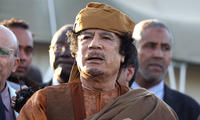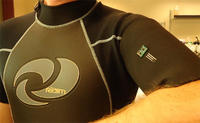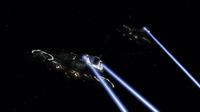-
The art of signature replication
A Rockville, Maryland company’s signature replication technology is so advanced, DHS sends its agents there to learn; using sophisticated computer software and its Autopen signing machines, Damilic is capable of replicating signatures that so closely resemble the original hand written version, forensic scientists are needed to be able to tell the difference
-
-
Qaddafi's Tripoli suicide plan

Libya’s prime minister confided in Russia’s envoy to Africa that Col. Qaddafi has a suicide plan for Tripoli if the rebels took over the city; the regime plans to shower the city with missiles and destroy it rather see the rebels control it; Libya has plenty of surface-to-surface missiles, and so far it has not used any of them against the rebels
-
-
Deterring cyberwar, police gear and the law, guarding the guardians
Gen. James Cartwright, vice chairman of the Joint Chiefs of Staff, described the current U.S. cyberdefense policy as “too predictable”; he added that “[the current policy is] purely defensive. There is no penalty for attacking us now. We have to figure out a way to change that”; he said the new U.S. cyberdefense policy is the first step toward correcting current deficiencies; a Massachusetts company is selling local police forces a new iPhone app that scans a suspect’s iris and matches it to a national database of felons; there are questions about whether or not this app — which costs $3,000 — violates the Constitutional prohibition of unreasonable searches; the former mayor, the police chief, and member of the city council of a New Mexico border town have been charged with smuggling guns to the Mexican cartels; some of these guns have been linked to at least eight murders in Mexico
-
-
Tough new Alabama immigration law divides community
A sweeping new Alabama immigration law is generating sharp controversy and unease with many likening it to a return to the state’s brutal Jim Crow laws; among the strict immigration measures passed last month, undocumented immigrants are banned from enrolling in or attending college, applying for work, and landlords are restricted from renting property to illegal aliens; the law even requires school districts to check the immigration status of children; the bill has drawn fierce criticism from immigration advocates, churches, and civil liberties groups.
-
-
Senator Schumer demands release of northern counternarcotics strategy
Senator Charles Schumer (D-New York) is demanding that the Office of National Drug Control Policy (ONDCP) release its Northern Border Counternarcotics strategy immediately; the strategy was due on 5 July as stipulated by a law passed in January; the law came in response to a to a Government Accountability Office (GAO) report which found that only thirty-two miles along the nearly 4,000 mile U.S.-Canada border had “an acceptable level of security”
-
-
AntiSec hacks IRC Federal, posts passwords online
Last Friday, AntiSec, a prominent hacking group, announced that it had successfully infiltrated the servers of IRC Federal; the company has contracts with several major government agencies including the Department of Justice, the Army, Navy, and NASA; in an announcement on their website, AntiSec wrote, “We laid nuclear waste to their systems, owning their pathetic Windows box, dropping their databases and private emails, and defaced their professional looking website”
-
-
Sector Report for Tuesday, 12 July 2011: Law Enforcement Technology
This report contains the following stories.
Plus 1 additional story.
-
-
Five years on: Israel-Hezbollah 2006 war

Five years ago today, a war broke out between Israel and Hezbollah after Hezbollah fighters made a foray into Israel, killing several soldiers and carrying the bodies of two of them back into Lebanon; despite the uneven scale of death and damage — Israel has inflicted much more damage on Hezbollah and Lebanon — the war was initially perceived as an Israeli defeat because Israel was unable to stop Hezbollah from firing rockets into Israel during the entire conflict; more recently, though, this initial conclusion has been revised somewhat, with some analysts pointing out that the Israel-Lebanese border has been quiet during the past five years — the longest period it has been so quiet; a respected Israeli military analyst says that the 2006 war was an Israeli failure — and unless Israel changes its definition regarding who the real enemy is, the next Israel-Hezbollah war will be and Israeli failure as well
-
-
Divorce leads to approval of GPS tracking in New Jersey
A divorce case in New Jersey has resulted in the first time a state court has approved the use of GPS devices to track individuals; last week a New Jersey appellate court ruled against a man who sued his ex-wife for placing a GPS device in the car she and her husband shared
-
-
Pilot programs reduce texting while driving by at least one third
Two pilot programs launched by the National Highway Traffic Safety Administration (NHTSA) aimed at minimizing texting while driving have reduced the practice by at least one third; the programs ran for one year starting in April 2010 and used a combination of stepped up law enforcement and public information campaigns in Syracuse, New York and Hartford, Connecticut
-
-
Peachtree City police win technology award for traffic enforcement
The Peachtree City police department in Georgia recently won the annual National Law Enforcement Challenge’s Technology award for its innovative approach to traffic safety; with the use of a “data driven” approach to traffic safety, the Peachtree City excelled in occupant protection, deterring driving under the influence, and enforcing speed limits
-
-
Also Noted
GPS tracking rules * License plate readers are “hot” * NC police get help online * 25 years for LoJack * PA police get patrol car web access
-
-
Sensors printed on wetsuits detect explosives, other hazards

UC Sand Diego researcher has successfully printed thick-film electrochemical sensors directly on flexible wetsuit material, paving the way for nano devices to detect underwater explosives or ocean contamination; UCSD has a full U.S. patent pending on the technology, and has begun talks on licensing the system to a Fortune 500 company
-
-
North Carolina jail investigated for immigration violations
A jail in North Carolina is currently under federal investigation on charges that local law officers mistreated detainees held as part of an immigration enforcement program; the investigation comes at the request of the state’s American Civil Liberties Union (ACLU) which requested that DHS officials investigate the Wake County jail based on fifty-seven complaints made by individuals detained there in 2009 and 2010; the complaints stem from the 287(g) program which allows local police officers to enforce federal immigration laws
-
-
New technology increase potency of beam weapons

Laser scientists and engineers have long recognized that direct-diode lasers can offer significant advantages over other laser technologies due to their efficiency, reliability, compactness, and relatively low cost; applications for direct-diode lasers have been limited, however, owing to their low brightness — a combination of lower power and poorer beam quality relative to alternative laser technologies; a Massachusetts-based company, using wavelength beam combining (WBC) technology, is offering a way to solve this problem — allowing direct-diode lasers to be used in demanding industrial applications — and in effective beam weapons
-
More headlines
The long view
Why Was Pacific Northwest Home to So Many Serial Killers?
Ted Bundy, Gary Ridgway, George Russell, Israel Keyes, and Robert Lee Yates were serial killers who grew up in the Pacific Northwest in the shadow of smelters which spewed plumes of lead, arsenic, and cadmium into the air. As a young man, Charles Manson spent ten years at a nearby prison, where lead has seeped into the soil. The idea of a correlation between early exposure to lead and higher crime rates is not new. Fraser doesn’t explicitly support the lead-crime hypothesis, but in a nimble, haunting narrative, she argues that the connections between an unfettered pollution and violent crime warrant scrutiny.
Bookshelf: Smartphones Shape War in Hyperconnected World
The smartphone is helping to shape the conduct and representation of contemporary war. A new book argues that as an operative device, the smartphone is now “being used as a central weapon of war.”
